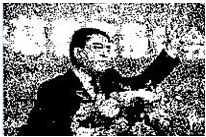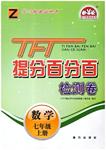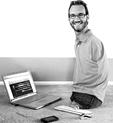题目内容
 Chen Guangbiao was born in Jiangsu in July,1968. He is the chairperson of a company in Jiangsu. Now he is one of China’s richest men and he has donated a great amount of money to charity projects. He says he will donate everything he has to charity after he dies.
Chen Guangbiao was born in Jiangsu in July,1968. He is the chairperson of a company in Jiangsu. Now he is one of China’s richest men and he has donated a great amount of money to charity projects. He says he will donate everything he has to charity after he dies.When people are in need of help, he will appear at once. He helped people during the Wenchuan earthquake, the Yunnan earthquake and the Taiwan earthquake. He also gave a helping hand in Japan’s earthquake. He has built many Hope Primary Schools to support the education in poor areas.
He doesn’t do charity for honour. He wants to encourage more people to make contributions to charity. After announcing he would donate everything to charity after his death, many businesses, overseas(海外)Chinese people and common people encouraged by him have also promised to do something for charity.
As a philanthropist(慈善家),he is asked for help every day. Sometimes he gets very tired, but he has never stopped caring.
So far, he has received a lot of awards, including Pioneer of the Year, and National May Day Labour Medal(全国五一劳动奖章).He is considered as one of china’s top philanthropists.
小题1:The article is probably taken from _______.
| A.a newspaper | B.a novel | C.a detective story | D.a science book |
| A.nothing | B.some schools |
| C.everything he has | D.his whole company |
| A.He wants to do charity for money. |
| B.He wants to do charity for pleasure. |
| C.He wants to ask people to help him. |
| D.He wants to encourage more people to contribute to charity. |
| A.He is from Jiangsu. |
| B.He has visited many countries. |
| C.He has helped people in need. |
| D.He has got a lot of awards. |
| A.Earthquakes. | B.Hope Primary Schools. |
| C.Pioneer of the Year. | D.Philanthropist Chen Guangbiao |
小题1:A
小题2:C
小题3:D
小题4:B
小题5:D
小题1:本文主要谈论慈善家陈光标的有关情况,所以有可能本篇文章出现在报纸上,故本题选A。
小题2:本文第一段最后一句为He says he will donate everything he has to charity after he dies.所表示的含义为陈光标说他死过之后将把他所拥有的一切捐给慈善机构,故本题选C。
小题3:本文第三段第二句为He wants to encourage more people to make contributions to charity.表达的意思为他想鼓励更多的人们为慈善机构做贡献,故本题选D。
小题4:本文中没有提到陈光标参观了许多国家,故本题选B。
小题5:本文主要谈论了慈善家陈光标的有关情况,故本题最佳标题是有关慈善家陈光标的,故本题选D。

练习册系列答案
 提分百分百检测卷系列答案
提分百分百检测卷系列答案
相关题目

 ixty
ixty reatest inventor.
reatest inventor. IMAGINE a life without arms or legs! You can’t hold anyone in your 26 . You can’t walk anywhere with your feet. How would you last a day like that? Would you 27 at yourself in the mirror like Nick Vujicic, the 29-year-old Australian?
IMAGINE a life without arms or legs! You can’t hold anyone in your 26 . You can’t walk anywhere with your feet. How would you last a day like that? Would you 27 at yourself in the mirror like Nick Vujicic, the 29-year-old Australian? urf and play golf. In college, he achieved great success and was among the 34 students in the studies. And he decided on 35 to do later in his life—to encourage others to work hard for their dreams.
urf and play golf. In college, he achieved great success and was among the 34 students in the studies. And he decided on 35 to do later in his life—to encourage others to work hard for their dreams.